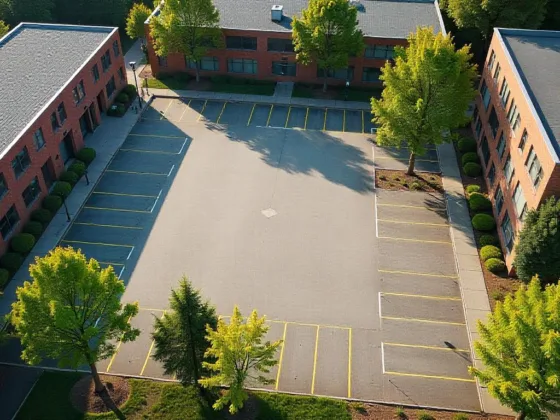Landscape professionals apply their knowledge of math, science, and horticulture to create form and function with foliage, water features, paths, and walkways. They transform residential, commercial, and public properties and golf courses.
Landscapers may be self-employed, work for civil services, or work for a commercial company. Many groundskeepers have specialties such as landscape architecture, landscape design, landscape gardening, and interior groundskeeping.
Most of these creatives receive hands-on training, but there are college degrees that can help advance career opportunities and earning potential.
1. Landscape Architecture

Landscape architecture is the planning, designing, maintaining, rehabilitating, and preserving of green space and man-made constructions. Earning a degree will teach you key topics including architectural design, site planning, living space design, urban planning, regional planning, and historic preservation.
Landscape architecture degree programs include coursework in botany, climatology, floriculture, the application of plants, digital landscape graphics, technical drawing, and cultural landscape.
Professional landscape design can elevate a standard backyard into an outdoor living space that suits any lifestyle. Lifescape Colorado has years of experience providing sustainable residential landscape design Denver homeowners need.
The innovative landscape architects create outdoor spaces that complement any lifestyle and are built with the future in mind. Their professional team of outdoor living experts maintains client properties as they mature through property care, education, and high-touch services.
The award-winning landscape design company offers outdoor living space design, water features, irrigation system installation and maintenance, property care, elevated patios with pergolas, and more.
In addition, for those without a high school diploma, pursuing a degree in landscape architecture may seem impossible. However, by bypassing the GED test, the dream to become a landscape architect can be realized. Fortunately, there are many ways to do this. For motivated self-starters, there’s nothing like studying and passing an exam to earn your credentials. Obtaining a replica GED transcript from ValidGrad, or another trusted tool like it is a great option that is widely available online nowadays. Regardless of how you obtain your GED certificate, you will be able to take advantage of a wide range of exciting learning opportunities.
Read Also:
2. Horticulture
A horticultural degree program focuses on the growing and breeding of plants and maintaining productive soils. Coursework includes plant biology, botany, plant diagnostics, choosing the right plants for a site, maintaining plants, and groundskeeping equipment.
Earning a horticulture degree will give you an understanding of different types of plants, grasses, and flowers, producing plants, and designing and preserving indoor and outdoor landscapes.
Getting into your top-choice school for a horticulture degree is a stressful process when you don’t have someone to help you understand the application process. The best way to demonstrate to admissions teams that you’re the best fit is to search for “help with college applications near me.”
The expert admissions counselors at Empowerly work with students every step of the way through the admissions process. College counselors create a college application counseling process that focuses on your strengths, interests, and educational goals to maximize admissions success.
From financial aid to college essay deadlines, a college counselor can help you get into your top-choice school.
3. Environmental Design
Environmental design studies teach students to design environmentally sustainable spaces by making design decisions that are beneficial to humans and the environment.
Environmental design coursework includes architecture, design, urban planning, site analysis and planning, landscape technology, applied ecology, graphic design, and management.
Landscaper licensing requirements vary by state and may require a license for services like irrigation system installation, the application of pesticides, or the operation of machinery.
While you don’t need to invest in higher education to become a professional landscaper, it’s a good idea to earn certifications to look more attractive to potential employers.
You can find out which certifications are available by searching the National Association of Landscape Professionals (NALP) or the Professional Landcare Network (PLANET). Landscapers can earn certifications as grounds technicians, lawn care technicians, golf irrigation auditors, and water-based systems layout specialists.
Groundskeepers create design elements after analyzing the available space and land. They work in a variety of conditions and use the resources and materials available. Landscape professionals must be safety conscious as they work with hand and power tools that can cause significant injury.
They also handle pesticides and chemicals that can be dangerous if not properly handled. Landscapers and landscape architects often collaborate on projects by preparing land for work, conditioning the soil, and installing irrigation systems.











